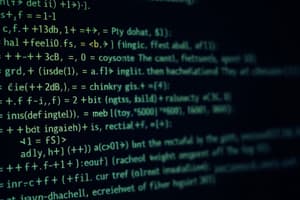Podcast
Questions and Answers
Match the following concepts with their definitions:
Match the following concepts with their definitions:
Recursion = A technique where a function calls itself to solve problems. Iteration = A method of repeating steps until a condition is met. Factorial = The product of an integer and all the integers below it. Array = A data structure that holds a fixed-size sequential collection of elements.
Match the following operations with their typical implementations:
Match the following operations with their typical implementations:
Calculating sum of numbers = Iterating through an array to accumulate values. Searching for a word = Iterating word by word through text. Computing factorial = Using a loop to multiply numbers. Finding minimum value = Comparing values in an array iteratively.
Match the programming constructs with their characteristics:
Match the programming constructs with their characteristics:
For loop = Used for executing a fixed number of iterations. Recursive function = Solves a problem by calling itself. While loop = Continues until a specified condition is false. Do-while loop = Executes at least once before checking the condition.
Match the following examples with their types:
Match the following examples with their types:
Match the following terms with their respective outputs or definitions:
Match the following terms with their respective outputs or definitions:
What is recursion in programming?
What is recursion in programming?
Iteration is more suited for problems that can be divided into smaller problems.
Iteration is more suited for problems that can be divided into smaller problems.
What type of problems can recursion naturally solve?
What type of problems can recursion naturally solve?
In C++, the factorial function can traditionally be implemented using _____ or recursion.
In C++, the factorial function can traditionally be implemented using _____ or recursion.
Flashcards
Recursion
Recursion
A programming technique where a function calls itself to solve a problem by breaking it down into smaller, similar subproblems until a base case is reached.
Iteration
Iteration
A programming technique that repeats a block of code a certain number of times or until a condition is met.
Base Case
Base Case
The simplest version of a problem in recursion, a case that can be solved directly without further recursion.
Factorial calculation (recursion)
Factorial calculation (recursion)
Signup and view all the flashcards
Factorial
Factorial
Signup and view all the flashcards
Recursive Function
Recursive Function
Signup and view all the flashcards
Iteration vs. Recursion
Iteration vs. Recursion
Signup and view all the flashcards
Factorial Example
Factorial Example
Signup and view all the flashcards
Recursive Factorial
Recursive Factorial
Signup and view all the flashcards
Study Notes
Recursion in C/C++
- Recursion is a fundamental technique for designing computing procedures.
- It's implemented as a function that calls itself, solving a problem by breaking it down into smaller, identical subproblems until reaching a simple, solvable base case.
- Iterative methods use loops to repeat steps; recursion uses function calls.
- Recursion can offer more natural solutions in some cases compared to iteration.
Recursion vs. Iteration
- Calculations frequently use iteration, a loop that executes a block of code a set number of times, or until a condition is met.
- Examples include summing array elements, searching for a word in a text.
- Recursive approach involves a series of function calls to generate a solution, while iteration uses looping constructs.
Recursion Example #1 - Factorials
- Iterative approach : A method to compute the factorial, employing a loop.
- Formula: factorial(N) = 1 * 2 * ... * N
- Code Example (Iterative):
long factorial(int N) {
long fact = 1;
for (int i = 1; i <= N; i++) {
fact *= i;
}
return fact;
}
-
Recursive Approach: A function that calculates factorial recursively.
-
Formula: factorial(N) = N * factorial(N-1), where factorial(0) = 1 (base case)
-
Code Example (Recursive):
long factorial(int N) {
if(N == 0) {
return 1; // base case
} else {
return N * factorial(N - 1); // recursive step
}
}
- The recursive function calls itself until it reaches 0, then returns values back up the call chain, building the result
Recursion Example #2 - Reverse a String
- Concept: Prints the characters of a string in reverse using recursion.
- Base Case: If the index reaches the end of the string, return.
- Recursive Step: Call the function recursively with an incremented index.
- Output: The character at the current index is printed after the recursive call completes.
Recursion Example #3 - Counting
- Recursion for counting from a starting value down and up to a base case.
- Code Examples:
void countDown(int i) {
if (i <= 0) return;
cout << i << " ";
countDown(i - 1);
}
void countUp(int i) {
if (i <= 0) return;
countUp(i - 1);
cout << i << " ";
}
- The difference is the placement of the
coutstatement in relation to the recursive function call.
Recursion Example #4 - Fibonacci Sequence
- Definition: A sequence where each number is the sum of the two preceding ones, usually starting with 0 and 1.
- Recursive Calculation:
long fibonacci(long n){
if ((n==1) || (n==0)) return n;
else return fibonacci(n-1) + fibonacci(n-2);
}
- This approach computes each Fibonacci number by adding the previously calculated Fibonacci numbers, which is inefficient.
Recursion and Stack Overflow
- Recursive calls result in function calls stacked, and that stack exhausts for deep recursion if the base case can't reach in certain algorithms
Function Default Arguments
- Functions can accept default values for parameters.
- Default values should be in the trailing parameters.
Studying That Suits You
Use AI to generate personalized quizzes and flashcards to suit your learning preferences.




